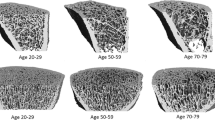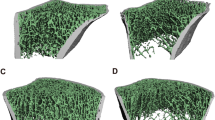Abstract
Summary
Limited prospective evidence exists regarding bone microarchitectural deterioration. We report annual changes in trabecular and cortical bone microarchitecture at the distal radius and tibia in postmenopausal women. Lost trabeculae with corresponding increase in trabecular thickness at the radius and thinning tibial cortex indicated trabecularization of the cortex at both sites.
Introduction
Osteoporosis is characterized by low bone mass and the deterioration of bone microarchitecture. However, limited prospective evidence exists regarding bone microarchitectural changes in postmenopausal women: a population prone to sustaining osteoporotic fractures. Our primary objective was to characterize the annual change in bone area, density, and microarchitecture at the distal radius and distal tibia in postmenopausal women.
Methods
Distal radius and tibia were measured using high-resolution peripheral quantitative computed tomography (HR-pQCT) at baseline and 1 year later in 51 women (mean age ± SD, 77 ± 7 years) randomly sampled from the Saskatoon cohort of the Canadian Multicentre Osteoporosis Study (CaMos). We used repeated measures analysis of variance (ANOVA) with Bonferroni adjustment for multiple comparisons to characterize the mean annual change in total density, cortical perimeter, trabecular and cortical bone area, density, content, and microarchitecture. Significant changes were accepted at P < 0.05.
Results
At the distal radius in women without bone-altering drugs, total density (−1.7 %) and trabecular number (−6.4 %) decreased, while trabecular thickness (+6.0 %), separation (+8.6 %), and heterogeneity (+12.1 %) increased. At their distal tibia, cortical area (−4.5 %), density (−1.9 %), content (−6.3 %), and thickness (−4.4 %) decreased, while trabecular area (+0.4 %) increased.
Conclusions
The observed loss of trabeculae with concomitant increase in trabecular size at the distal radius and the declined cortical thickness, density, and content at the distal tibia indicated a site-specific trabecularization of the cortical bone in postmenopausal women.


Similar content being viewed by others
References
Bouillon R, Burckhardt P, Christiansen C, Fleisch H, Fujita T, Gennari C, Martin TJ, Mazzuoli G, Melton LJ, Ringe JD, Riis B, Peck WA, Samsioe G, Shulman LE (1991) Consensus development conference: prophylaxis and treatment of osteoporosis. Osteoporos Int 1:114–117
Kanis JA (2002) Diagnosis of osteoporosis and assessment of fracture risk. Lancet 359:1929–1936
Siris ES, Miller PD, Barrett-Connor E, Faulkner KG, Wehren LE, Abbott TA, Berger ML, Santora AC, Sherwood LM (2001) Identification and fracture outcomes of undiagnosed low bone mineral density in postmenopausal women: results from the national osteoporosis risk assessment. J Am Med Assoc 286(22):2815–2822
Cranney A, Jamal SA, Tsang JF, Josse RG, Leslie WD (2007) Low bone mineral density and fracture burden in postmenopausal women. Can Med Assoc J (CMAJ) 177(6):575–580
Beck T (2003) Measuring the structural strength of bones with dual-energy X-ray absorptiometry: principles, technical limitations, and future possibilities. Osteoporos Int 14(Suppl 5):S81–S88
Nielson SP (2000) The fallacy of BMD: a critical review of the diagnostic use of dual X-ray absorptiometry. Clin Rheumatol 19(174–183):174
Liu XS, Cohen A, Shane E, Yin PT, Stein EM, Rogers H, Kokolus SL, McMahon DJ, Lappe JM, Recker RR, Lang T, Guo XE (2010) Bone density, geometry, microstructure, and stiffness: relationships between peripheral and central skeletal sites assessed by DXA, HR-pQCT, and cQCT in premenopausal women. J Bone Miner Res 25(10):2229–2238
Leib ES, Lewiecki EM, Binkley N, Hamdy RC (2004) Official position of the International Society for Clinical Densitometry. J Clin Densitom 7(1):1–5
National Osteoporosis Foundation (2010) Clinician’s guide to prevention and treatment of osteoporosis. National Osteoporosis Foundation, Washington
Johnell O, Kanis JA (2006) An estimate of the worldwide prevalence and disability associated with osteoporotic fractures. Osteoporos Int 17(12):1726–1733
Cuddihy MT, Gabriel SE, Crowson CS, O’Fallon WM, Melton LJ 3rd (1999) Forearm fractures as predictors of subsequent osteoporotic fractures. Osteoporos Int 9:469–475
Warriner AH, Patkar NM, Yun H, Delzell E (2011) Minor, major, low-trauma, and high-trauma fractures: what are the subsequent fracture risks and how do they vary? Curr Osteoporos Rep 9(3):122–128
Sornay-Rendu E, Boutroy S, Munoz F, Delmas PD (2007) Alterations of cortical and trabecular architecture are associated with fractures in postmenopausal women, partially independent of decreased BMD measured by DXA: the OFELY study. J Bone Miner Res 22(3):425–433
Boutroy S, Bouxsein ML, Munoz F, Delmas PD (2005) In vivo assessment of trabecular bone microarchitecture by high-resolution peripheral quantitative computed tomography. J Clin Endocrinol Metab 90(12):6508–6515
Dalzell N, Kaptoge S, Morris N, Berthier A, Koller B, Braak L, van Rietbergen B, Reeve J (2009) Bone micro-architecture and determinants of strength in the radius and tibia: age-related changes in a population-based study of normal adults measured with high-resolution pQCT. Osteoporos Int 20(10):1683–1694
Mueller TL, van Lenthe GH, Stauber M, Gratzke C, Eckstein F, Muller R (2009) Regional, age and gender differences in architectural measures of bone quality and their correlation to bone mechanical competence in the human radius of an elderly population. Bone 45(5):882–891
Burghardt AJ, Kazakia GJ, Ramachandran S, Link TM, Majumdar S (2010) Age- and gender-related differences in the geometric properties and biomechanical significance of intracortical porosity in the distal radius and tibia. J Bone Miner Res 25(5):983–993
Sode M, Burghardt AJ, Kazakia GJ, Link TM, Majumdar S (2010) Regional variations of gender-specific and age-related differences in trabecular bone structure of the distal radius and tibia. Bone 46(6):1652–1660
Zebaze RMD, Ghasem-Zadeh A, Bohte A, Iuliano-Burns S, Mirams M, Price RI, Mackie EJ, Seeman E (2010) Intracortical remodelling and porosity in the distal radius and post-mortem femurs of women: a cross-sectional study. Lancet 375:1729–1736
Macdonald HM, Nishiyama KK, Kang J, Hanley DA, Boyd SK (2011) Age-related patterns of trabecular and cortical bone loss differ between sexes and skeletal sites: a population-based HR-pQCT study. J Bone Miner Res 26(1):50–62
Laib A, Hauselmann HJ, Ruegsegger P (1998) In vivo high resolution 3D-QCT of the human forearm. Technol Health Care 6:329–337
Xtreme CT Operations Manual (2011) Version 6.1 edn. SCANCO Medical Ag Fabrikweg 2 CH-8306, Bruettisellen, Switzerland
Atkinson PJ (1964) Quantitative analysis of osteoporosis in cortical bone. Nature 201(4917):373–375
Burr DB (2010) Cortical bone: a target for fracture prevention? Lancet 375:1672–1673
Kreiger N, Tenehouse A, Joseph L, Mackenzie T, Poliquin S, Brown JP, Prior JC, Rittmaster RS (1999) The Canadian Multicentre Osteoporosis Study (CaMos): background, rationale, methods. Can J Aging 18(3):376–387
Duckham RL, Frank AW, Johnston JD, Olszynski WP, Kontulainen SA (2013) Monitoring time interval for pQCT-derived bone outcomes in postmenopausal women. Osteoporos Int 24(6):1917–1922
Papaioannou A, Morin S, Cheung AM, Atkinson S, Brown JP, Feldman S, Hanley DA, Hodsman A, Jamal SA, Kaiser SM, Kvern B, Siminoski K, Leslie WD, Scientific Advisory Council of Osteoporosis C (2010) 2010 Clinical practice guidelines for the diagnosis and management of osteoporosis in Canada: summary. Can Med Assoc J 182(17):1864–1873
Kawalilak CE, Johnston JD, Olszynski WP, Leswick D, Kontulainen SA (2014) Comparison of short-term in vivo precision of bone density and micro-architecture at the distal radius and tibia between postmenopausal women and young adults. J Clin Densitom. doi:10.1016/j.jocd.2013.09.014
Pialat JB, Burghardt AJ, Sode M, Link TM, Majumdar S (2012) Visual grading of motion induced image degradation in high resolution peripheral computed tomography: impact of image quality on measures of bone density and micro-architecture. Bone 50(1):111–118
Laib A, Hildebrand T, Hauselmann HJ, Ruegsegger P (1997) Ridge number density: a new parameter for in vivo bone structure analysis. Bone 21(6):541–546
Laib A, Ruegsegger P (1999) Calibration of trabecular bone structure measurements of in vivo three-dimensional peripheral quantitative computed tomography with 28 μm resolution microcomputed tomography. Bone 24(1):35–39
Hildebrand T, Ruegsegger P (1997) A new method for the model-independent assessment of thickness in 3D images. J Microsc 185(1):67–75
Kazakia GJ, Burghardt AJ, Link TM, Majumdar S (2011) Variations in morphological and biomechanical indices at the distal radius in subjects with identical BMD. J Biomech 44(2):257–266
Vincent WJ (2005) Statistics in kinesiology, 3rd edn. Human Kinetics, Champaign, IL
Holzer G, von Skrbensky G, Holzer LA, Pichl W (2009) Hip fractures and the contribution of cortical versus trabecular bone to femoral neck strength. J Bone Miner Res 24(3):468–474
Schaffler MB, Burr DB (1988) Stiffness of compact bone: effects of porosity and density. J Biomech 21(1):13–16
Hansen S, Shanbhogue V, Folkestad L, Nielsen MM, Brixen K (2013) Bone microarchitecture and estimated strength in 499 adult Danish women and men: a cross-sectional, population-based high-resolution peripheral quantitative computed tomographic study on peak bone structure. Calcified tissue international
Lauretani F, Bandinelli S, Griswold ME, Maggio M, Semba R, Guralnik JM, Ferrucci L (2008) Longitudinal changes in BMD and bone geometry in a population-based study. J Bone Miner Res 23(3):400–408
Mayhew PM, Thomas CD, Clement JG, Loveridge N, Beck TJ, Bonfield W, Burgoyne CJ, Reeve J (2005) Relation between age, femoral neck cortical stability, and hip fracture risk. Lancet 366(9480):129–135
Melton LJ 3rd, Riggs BL, Keaveny TM, Achenbach SJ, Kopperdahl D, Camp JJ, Rouleau PA, Amin S, Atkinson EJ, Robb RA, Therneau TM, Khosla S (2010) Relation of vertebral deformities to bone density, structure, and strength. J Bone Miner Res 25(9):1922–1930
Burghardt AJ, Kazakia GJ, Sode M, de Papp AE, Link TM, Majumdar S (2010) A longitudinal HR-pQCT study of alendronate treatment in postmenopausal women with low bone density: relations among density, cortical and trabecular microarchitecture, biomechanics, and bone turnover. J Bone Miner Res 25(12):2558–2571
Riggs BL, Melton LJ 3rd (1995) The worldwide problem of osteoporosis: insights afforded by epidemiology. Bone 17(5):505S–511S
Kanis JA, McCloskey EV, Johansson H, Oden A, Melton LJ 3rd, Khaltaev N (2008) A reference standard for the description of osteoporosis. Bone 42(3):467–475
Acknowledgments
We would like to thank all our CaMos Saskatoon cohort participants for their continued altruism and volunteering for scientific research. We thank Andrew Frank and Jola Thingvold for coordinating the study measurements. We would also acknowledge the University of Saskatchewan, Canadian Institutes of Health Research (CIHR), Saskatchewan Health Research Foundation (SHRF), and the Canadian Foundation for Innovation (CFI) for financial support.
Conflicts of interest
None.
Author information
Authors and Affiliations
Corresponding author
Rights and permissions
About this article
Cite this article
Kawalilak, C.E., Johnston, J.D., Olszynski, W.P. et al. Characterizing microarchitectural changes at the distal radius and tibia in postmenopausal women using HR-pQCT. Osteoporos Int 25, 2057–2066 (2014). https://doi.org/10.1007/s00198-014-2719-0
Received:
Accepted:
Published:
Issue Date:
DOI: https://doi.org/10.1007/s00198-014-2719-0




